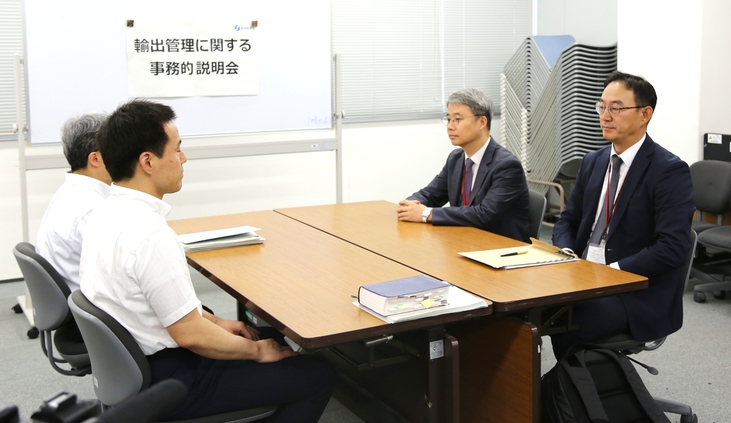 |
|
The first round of working-levels talks between South Korea and Japan regarding the latter’s recent export controls on July 12 in Tokyo. Representing South Korea are Chun Chan-soo, chief of trade security in the Ministry of Trade, Industry, and Energy, and Han Cheol-hee, chief of its trade (right side). Representing Japan are Iwamatsu Jun, trade management chief of the Trade Ministry; and Igari Katsuro, security trade management chief.
|
Sudden reversal of attitude indicates Tokyo’s shift in official stance
The Japanese government explained that the “inappropriate issues” it cited as a reason for its controls on South Korean exports were not a reference to smuggling to North Korea. The remarks suggest that Japan is adopting a different stance in official settings after numerous remarks from Prime Minister Shinzo Abe and other political figures suggesting the control measures were related to North Korea. According to the South Korean side, previous remarks could also be interpreted as indicating that the reasons behind the policies regulating exports to South Korea stem from problems with Japan’s own export management. Speaking on July 12 after a meeting of division heads from South Korean and Japanese trade ministries at the Ministry of Economy, Trade and Industry (METI) annex in Tokyo’s Chiyoda ward, a METI official commented on the “occurrence of inappropriate issues” previously cited by Tokyo as a reason for the export controls. “We communicated [to South Korea] that it was not a matter of items being transported to third party countries,” the official said. The same official remarked, “While it has been reported in some [Japanese media] that [the reason] was items being transported to third party countries, we communicated that it was entirely a matter of inappropriate issues related to Japan-South Korea trade.” When it first announced its South Korean export control measures on July 1, the Japanese government cited “damage to the relationship of trust between the two sides” as its chief reason, only to face criticisms even at home for violating the spirit of free trade with its measures. In response, numerous key Japanese government officials began making remarks implying – without any real evidence – that export items may have been smuggled from South Korea to North Korea or other third parties. The remarks suggested Tokyo’s objective was to take advantage of anti-North Korea sentiment in Japan to portray South Korea as being “problematic” on security. “South Korea has said that it is ‘upholding sanctions with sanctions [against North Korea]’ and ‘properly managing trade [with regard to North Korea],’” Abe said at the time. “[Yet] it has become apparent that it is not upholding its international promise regarding the conscripted worker issue. It stands to reason that we would anticipate it would not uphold [its promises] in terms of trade management either,” he continued. In a July 4 appearance on Fuji TV, Koichi Hagiuda, acting Liberal Democratic Party secretary-general and a close associate of Abe’s, said, “Since cases were discovered where it appeared the destination [of chemicals] could not be determined, we felt it was only right to take measures in response to such things.” Fuji TV also quoted a ruling party official as saying, “At some point, there was a rush of large orders for products related to fluorine (highly pure hydrogen fluoride/etching gas), yet their whereabouts at the South Korean companies became unclear [after exportation].” “The destination was the north, as [etching gas] can be used for the production of toxic gases and chemical weapons,” the report said. Japan claims “weakness” of S. Korea’s trade management system as reason At a surface level, the reason for export regulations emphasized by Japan during the meeting had to with alleged issues with the South Korean export management system. Having taken initial steps on July 4 to beef up its export controls on semiconductor materials and two other items, the Japanese government is going through procedures to remove South Korea in mid-August from its “white list” of countries granted exemptions from applying for export permits for high-tech materials. “Regarding the national category reconsideration [to remove South Korea from the white list], we talked about how weak the South Korean [trade management] system is,” a METI official said. “In a world of security guarantees, you have numerous things such as the creation of systems, reviews [for exports], and policing of violations. These need to be comprehensive, rational, and effective,” the official said. “This entails a personnel orientation and technological improvements to that end. We questioned whether [South Korea] is not still vulnerable in this regard,” the official continued. Commenting on the reasons for the export control measures on semiconductor materials and two other items, another METI official said, “We explained that Japan needs to fulfill its responsibility as a supplier.” But the South Korean Ministry of Trade, Industry, and Energy (MOTIE) said Japan had “explained that there were inadequacies with [Japanese companies’] legal compliance in exports from Japan to South Korea.” By Cho Ki-weon, Tokyo correspondent Please direct comments or questions to [english@hani.co.kr]





